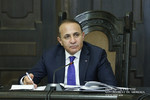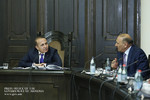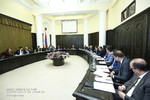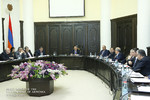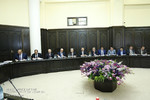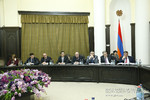Tuesday, 31 March 2015
Ministry of Finance Submits Performance Report
Chaired by Prime Minister Hovik Abrahamyan, the Government discussed the Ministry of Finance-submitted report on key activities and priority tasks in 2014 in compliance with the Government’s Action Plan, as well as the Ministry’s estimated performance report.
Finance Minister Gagik Khachatryan advised that throughout 2014 the Government‘s fiscal policy continued to be focused on the maintenance of macroeconomic stability, with a special emphasis on economic growth policy. The Minister said the State budget’s expenditure side was implemented smoothly and without problems last year.
Monetary policy was aimed at easing the monetary conditions promoting thus expansion of the aggregate market demand and reinstating the low pace of inflation in the country.
In 2014, amid the aforementioned economic developments, budget revenue (exclusive of grant proceeds) amounted to AMD1 trillion 137.1 billion, boasting a 6.6 percent rise as compared to the same period in 2013.
AMD1064.2 billion was collected in revenue, of which AMD700bn in tax receipts. Total budget expenditure (without external loan and grant program appropriations) amounted to AMD 1,168.9 billion, a 14 percent increase over the previous year.
The State budget deficit (excluding grants and loan programs) stood at 0.7 percent of GDP against the previous year’s surplus of 1 percent. The draft medium-term expenditure program for 2015-2017 was designed and approved.
Gagik Khachatryan noted that in drafting the 2015 State budget bill a draft law on amendments to the Law on Financial Equalization was developed, which was approved by the National Assembly.
Budget estimate databases were built up and expanded, electronic data collection and tabulation software systems were introduced.
To create a more favorable tax environment for SMEs, new laws were passed aimed at reducing the tax burden for SMEs and exempting family businesses from taxes at all.
To achieve greater tax exposure in the shadow economy, a number of laws and regulations were passed to expand the scope of goods subject to mandatory labeling.
In order to improve the business environment and raise the level of economic activity in rural communities, economic entities engaged in border communities were exempted from taxes. The threshold applicable to the VAT payment deferment for goods imported under investment programs was eliminated. Citizens have now the opportunity to purchase apartments involved in the servicing of mortgage loans with interest paid by the borrower’s income tax refund amounts.
Budget loans have been extended, with monitoring implemented for current and overdue liabilities assumed under the latter and the previously contracted loans.
In a bid to curb pervasive shadow turnover and ensure documentation of all transactions, the Ministry managed to reveal several instances of understatement of actual turnover and prices in different taxpayers along with numerous cases of unregistered employees.
As a whole, owing to year-long efforts aimed at curbing the shade in the economy, additional 16 billion drams were credited to the budget in the second half of 2014.
Coming to the treasury system, the Minister reported that expenditures were implemented smoothly throughout the budget exercise in 2014, preventing extra budget debt from accumulating.
Expanded was the Client-Treasury central treasury accounts e-governance system.
New rules and procedures were developed and approved for public procurements to tackle a number of key problems available in this area.
Work was carried out to develop new electronic control and management systems. In particular, the Taxpayer-3 system was supplemented with 5 new modules and 18 new reporting forms. The complex of new generation cash registers was integrated with the other systems. As a result, taxpayers were enabled to write off their tax bills immediately through the cash register. The Tax Free automated subsystem was introduced for the refund of VAT amounts to foreign nationals.
711 operational intelligence activities were conducted to check the status of fiscal liabilities in several taxpayers, which led to additional 12.8 billion drams credited to the budget. 346 cases of illegal business activity were revealed, and 107.2 million dram-worth administrative acts compiled.
In the period under review, 190 thousand calls were received over the Finance Ministry’s standing hotline. In the meantime, the Ministry received 131,762 written orders and applications, which were processed in the prescribed manner. 7790 were instructions issued by the Government Staff, which were complied with completely.
In conclusion, the meeting touched upon the Finance Ministry’s activities, tasks and priorities in 2015.
Taking note of the report, the Prime Minister pointed to the importance of continued fiscal policy development, business environment improvement and shadow reduction activities, as well as the need to push ahead with the ongoing tax and customs reforms.







